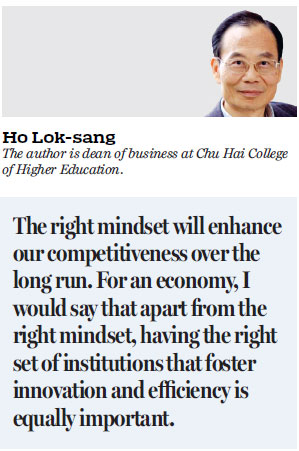Culture and institutions play a vital role in competitiveness
Updated: 2018-06-19 06:40
(HK Edition)
|
|||||||||
We live in an increasingly globalized world. Globalization is first and foremost driven by technological change. With modern information and communication technology, many jobs can be outsourced to remote places, and every worker, every business, will have to face the possibility that a former safely captured market will be opened up to many more competitors. No wonder there is so much concern about competitiveness, of which there are now a myriad of different measures and different rankings.
In order to gauge overall global competitiveness, typically researchers will look for indicators about institutions, infrastructure, the quality of the labor force, the quality of the government, ability to innovate, the size of the market, the cost of land and that of labor, openness and efficiency of markets, etc. In a report released in late May, the International Institute of Management Development based in Lausanne, Switzerland, ranked Hong Kong second, after the United States but ahead of Singapore. According to IMD, Hong Kong's strengths lie in government efficiency and business efficiency, while Hong Kong's weaknesses lie in technological infrastructure and education as well as health and the environment.

IMD's repeatedly ranking Hong Kong over Singapore may give our government officials a false sense of complacency. They need to be reminded that Singapore was ranked ahead of Hong Kong, which slipped to the fourth place, in the Global Financial Centre Index ranking released in March. They also need to understand that the first place in government efficiency is not really deserved. Singapore and Hong Kong talked about electronic road pricing about the same time in the seventies, and I was its early advocate. But Singapore has long used electronic road pricing to manage congestion. Hong Kong is still talking about this. Singapore has implemented various rounds of healthcare reform, improving its healthcare system in every turn, but Hong Kong is still beating about the bush.
Soon after the release of the IMD global competitiveness rankings, an article in China Daily carried a notable title: "Competitiveness (is) a state of mind". This title echoes an article of mine written on April 11, 2016, "Open minds keep HK competitive." I want to argue that for all practical purposes what really matters in the competitiveness of a person indeed is "mindset". We all have to live with our legacy. Some of the factors that we have to live with for now may well drag down our ranking in competitiveness.
But the right mindset will enhance our competitiveness over the long run. For an economy, I would say that apart from the right mindset, having the right set of institutions that foster innovation and efficiency is equally important.
In a report on Hong Kong's long term competitiveness that I wrote for Savantas Policy Institute I had referred to a book by Hwy-chang Moon, who described South Korea's formula for economic success as ABCD. A stands for Agility; B stands for Benchmarking; C stands for Convergence; D stands for Dedication. He wrote: "the Korean government, corporations, and people have exemplified these factors in achieving their current level of success." What he meant is that to be successful, an economy has to be flexible and able to adapt. It has to learn from the success and failures of others, to focus the efforts on one's competitive edge, and to have unity of purpose and dedication. All this can easily be summarized as "a fighting spirit with an open mind to learn to excel." Agility and benchmarking imply an open mind, ready to learn from others. Convergence implies unity and working together. Dedication implies a commitment to the identified purpose.
"ABCD" is all about culture. But institutions are just as important. Hong Kong is deservedly the world's freest and most open economy. Its market institutions are mature; and its market participants are highly responsive to market signals. It ranks high in the rule of law, and Hong Kong has excellent institutions to contain corrupt practices. However, there are some institutions that actually undermine unity and create distrust and divisiveness in society without our knowing it.
Today, many youngsters see the "pro-establishment" camp as siding with the "rich and powerful." This has to do with some features in our tax system and with some recent policy initiatives that are seen to be such. In particular, Hong Kong does not tax dividends and capital gains; its "standard tax rate" may lead to lower marginal tax rate for the super-rich than that for the middle class. Moreover, there are many loopholes in the tax system which allows the rich to avoid tax. For example, by selling a company that holds a property, the effective owner of a property can avoid the punitive stamp duty that must be paid by sellers who the records show directly own more than one property.
Economists see not taxing dividends as just a way to avoid double taxation, as dividends are paid from after-tax profits. Still, by sharply lowering the profit tax rate, we can argue that not all profits are taxed. Taxing half of the dividend paid out will then not constitute double taxation. Gestures like this may correct the perception of our SAR government siding with the rich and powerful, and give us an extra mile in promoting unity.
(HK Edition 06/19/2018 page8)